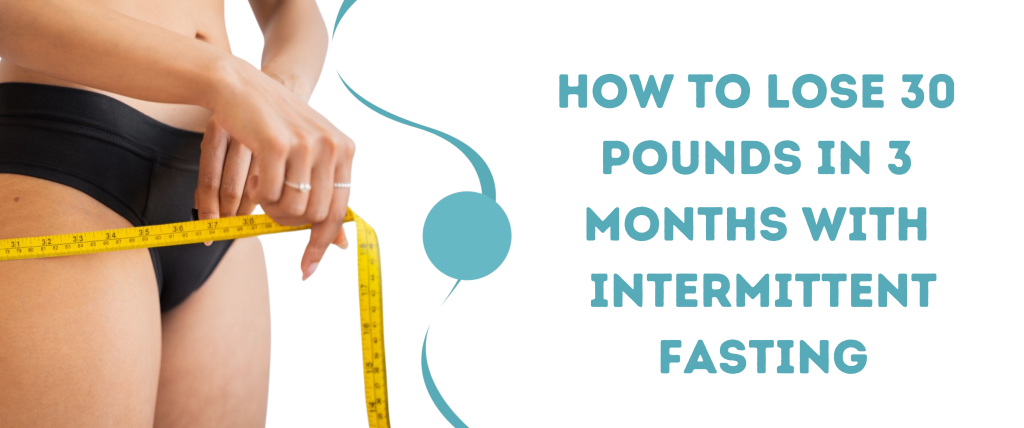|
Getting your Trinity Audio player ready...
|
Reviewed by: Dr. Sadie Wegler
Fact Checked by: Dr. Jordan Wheeler Kincaid

How to Lose 30 pounds in 3 months with intermittent fasting is the widely focused aim for many people. Intermittent fasting is one such method that is quite traditional, but because of its effectiveness is getting widely popular among today’s generation.
This is the world of a sedentary lifestyle. People with busy lives and daily work routines find it a burden to hit the gym and move their bodies. Strange but true. Traditional weight loss methods did not work for them anymore. They need some extra, which is convenient for them and can easily fit into their current lifestyle.
This is the beginning level of intermittent fasting. But what is intermittent fasting, and what does it do to the body? If you also want to know its benefits and are eager to lose 30 pounds in 3 months, then you have landed in the perfect place. Let us take a look at that.
What Is Intermittent Fasting?
If we understand fasting simply, it is just an on-and-off cycle of taking meals. Intermittent fasting is just the advancement of the same process quicker, repeating the cycle with a lesser gap.
Intermittent fasting is the best way to manage weight loss and reverse some serious diseases. Many diet plans focus on what to eat and what not to manage weight. But intermittent fasting focuses on when to eat. However, there are some unsaid rules when it comes to fasting.
In intermittent fasting, there is a specific time for eating meals. The evening or afternoon is the perfect time to grab some meals for yourself while you are on intermittent fasting. You are out of your feed for the rest of the day.
This cycle is to be followed for a week or a maximum of 15 days. Then switch to the normal routine, three meals a day. Then again, after a month or two, repeat the 15 days meal day cycle.
Intermittent fasting best works when you are regular and continuous in the process. It will not hamper your daily routine lifestyle and can be covered effortlessly even in your normal routine.
How Does Intermittent Fasting Work?

Our body is in continuous demand for energy. There are three steps through which our body takes up energy. First is the glycogen form. Glycogen is ready to use energy form for the body.
Our carbohydrates are directly converted into glycogen form to meet the demands of the body cells that do not require a molecular combination of the glycogen. Thus, it is the doorstep for the body to ask for energy.
The second here comes the fat. Fat stored in the body as fat cells are being oxidized in the presence of ample amounts of oxygen. The energy released by the burning of the fat will meet up the demand of the body.
The process will also use up the extra fat, making you slimmer and healthy. Burning visceral fat is easy because muscles in the extremities are in normal working condition. But the fat stored in the abdominal region requires more patience and vibrant energy as our abdominal part is not physically active.
The last doorstep is the proteins in the body. Proteins are the building blocks of the body. They are the raw materials for the rejuvenation of the cells. If your body utilizes proteins to meet the energy demands, then it is the end form of your body.
Your body is in self-destruction mode and will start eating itself. This is the most dangerous doorstep for energy demands; in later stages, it will lead to the person’s death.
Read more:
Methods Of Intermittent Fasting
Whenever we start new plans for our weight management, it is human tendency to hit the hardest of all of them. The same goes for intermittent fasting also.
If you want to lose weight with intermittent fasting, then definitely your subconscious will make you approach 24 to 36 hours of fasting on the very first day. But this is not necessary.
Everybody is different. What may work for others might not go well for you. Additionally, your body also needs time to prepare for fasting. Suddenly making food unavailable for your body will bring negative effects to it.
It is better to start fasting with minimum numbers. For the beginners 16/8 rule or 5/2 rule is easy to start with intermittent fasting, but what are they?
If you want to follow the fasting according to per day rule, then the 16/8 rule is for you. It is 16 hours of fasting and 8 hours of eating per day. These 8 hours are fixed for a day and should remain the same for better results.
If you want to follow the fasting according to the week, then the 5/2 rule is for you. It is five days, three-time meals, then restricting the meals to a single time for the next two days.
Try to limit your calories for the next two days up to minimum levels. This will make your fat cells burn to gain energy for daily routines.
What Should You Take Care Of?
16/8 and 5/2 are the two widely approachable methods for intermittent fasting. It will prepare your body for fasting without making it weak for daily routine work.
Longer fasting hours, like 24, 36, 48, and so on in the initial period, will make your body starve instead of using fat cells. Sudden low glycogen levels in the body will also cause a fall in our normal blood pressure.
This may initiate several heart diseases and continuous pain in the near future. Thus, it would be best not to jump to the higher side while starting intermittent fasting.
Give yourself and your proper body time to know what fasting is. When your body understands the rules, then go for a whole day’s fasting.
What To Eat In Intermittent Fasting

Whenever weight loss comes to mind, restricting calories and eating less than required always comes to mind. As if they go hand in hand for you. But is it effective the way it sounds in losing your extra ounces?
Restricting calories for weight loss works, but only when it is done in the right way. Restricting food also means putting restrictions on the nutritional flow to the body. It will adversely affect the growth and development of the body.
Nutrition is the fuel for the body’s normal functioning; from the normal hormone levels to the initiator of the physiological process, the contents of nutrition play a major role. It is good to eat while counting calories, but make sure you stay within the body’s nutritional flow.
Your Sleep Is Important
We agree that in the work pressure and meet daily requirements, 24 hours is much less time. But compromising your sleep because of the workload only puts stress on your body. Your body cells also need proper time to rest.
Giving rest to the cells also releases happy hormones in the body, thus meeting the basic needs of the body. A minimum of 8 hours of sleep is required to complete the rejuvenation process of the cells. Proper sleep is also responsible for managing the wear and tear of the body.
Bottom Line
So this was all about how to lose 30 pounds in 3 months with intermittent fasting. Intermittent fasting has the least side effects with great benefits. It can also reverse chronic digestive conditions and increase the body’s overall metabolic rate.
Know your body before stopping the carbohydrate influx. Do not starve yourself in the name of fasting. Make a balance chart between them before starting fasting to lose weight.
- Unlocking Els Pet: A Comprehensive Guide For New Purchasers - August 9, 2024
- Laser Hair Removal Costs in the US – Complete Guide - April 13, 2024
- Quinoa for Weight Loss – Effective Tips & Healthy Recipes - April 1, 2024
